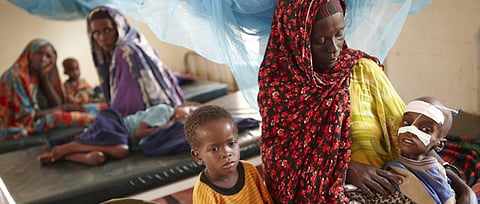

The Democratic Republic of the Congo (DRC) was facing the world’s largest food crisis, with around 21.8 million of its people being food insecure primarily due to the novel coronavirus disease (COVID-19) pandemic, a report released by the Global Network Against Food Crises alliance of humanitarian agencies said.
Most of the food‑insecure population in the country was located in Ituri, Tanganyika, Kasai Central and Kasai provinces, where conflict, insecurity and related displacement were already a major driver of food insecurity.
The indirect impact of COVID‑19 on livelihoods and economic activities, as well as pre‑existing macro‑economic challenges, significantly reduced the purchasing power of vulnerable households in 2020, particularly in urban areas.
Burkina Faso had also been suffering from an acute food crisis besides the DRC, the report said. The country witnessed a nearly 300 per cent uptick in the overall number of people experiencing acute hunger since the start of 2020.
Acute food insecurity was also being reported from northern Nigeria (73 per cent increase), Somalia (67 per cent increase) and Sudan (64 per cent increase).
It was critical to work together before the situation deteriorated, Qu Dongyu, director-general of the Food and Agriculture Organization, said at the event where the report was released.
He emphasised on prevention and early warning systems and actions.
The current food crisis was the biggest the world had seen for 50 years, Mark Lowcock, the United Nations’ under-secretary-general for humanitarian affairs and emergency relief coordinator, said at the event.
However, it was not too late to act to prevent acute hunger from becoming a long-lasting problem, he added.
The report emphasised that addressing the urgent issues arising from the COVID-19 pandemic in food crisis contexts was crucial. However, it should not detract attention from a sustainable and inclusive transformation of food systems.